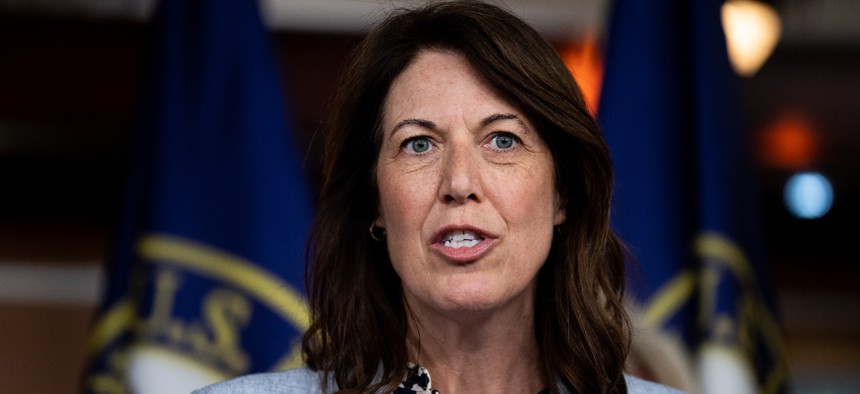
Rep. Cindy Axne, D-Iowa, said: "Every day, millions of working-aged women deal with menopause-related symptoms that take a toll on their families, disrupt their lives, careers, mental health and so much more." Bill Clark/CQ-Roll Call, Inc via Getty Images
A Bipartisan Bill Would Boost NIH’s Research on Menopause
The bill would also authorize additional funding for the agency.
A pair of House lawmakers introduced bipartisan legislation on Tuesday that would bolster the federal medical research agency’s ability to conduct research related to menopause and mid-life women’s health.
Reps. Cindy Axne, D-Iowa, and David McKinley, R-W.Va. brought forth a bill to “refocus” the agency to invest more in research on menopause, which typically affects women in their 40s and 50s. Symptoms can include depression, hot flashes and sleep disruption.
“Every day, millions of working-aged women deal with menopause-related symptoms that take a toll on their families, disrupt their lives, careers, mental health and so much more,” Axne said in a statement. “Yet, there’s not enough information regarding symptom management and treatment to help prevent these disruptions and ensure women can make good, informed decisions for themselves.”
Axne and McKinley’s bill would require the director of the National Institutes of Health to evaluate the current state of menopause research (including any gaps) relating to causes, symptoms and treatments as well as research on mid-life women’s health. The evaluation would also include the total amount of funding NIH has allocated for menopause and mid-life women’s health research for the previous five years.
NIH would be required to submit a report on that within 180 days of the bill’s enactment. The bill also would require NIH to develop a strategic plan to close research gaps and identify topics that need more research within 180 days.
Overall, the NIH director “shall conduct or support menopause related research and research on mid-life women’s health,” said the bill’s text. In order to carry out those things, the bill would authorize $100 million for both fiscal years 2023 and 2024.
“In recent years, research into more effective and safer treatments for menopause has leveled off, and funding for these initiatives has dipped to historic lows,” said a press release from the lawmakers. “This funding uncertainty hinders any long-term research initiatives, like finding new effective and safe treatments for menopause symptoms.”
Sharon Malone, a certified national menopause practitioner and chief medical officer of Alloy Women’s Health, and Jennifer Weiss-Wolf, the women and democracy fellow at the Brennan Center for Justice at the New York University School of Law and the author of “Periods Gone Public: Taking a Stand for Menstrual Equity,” published an opinion article in The Washington Post in April titled, “America lost its way on menopause research. It’s time to get back on track.” where they argued that “government must take the lead on needed reforms” to menopause research and treatments.
The Society for Women’s Health Research, a nonprofit that promotes research on biological sex differences in diseases and improvements for women’s health, welcomed the proposed, bipartisan bill.
“Despite menopause affecting 100% of women living into late life, research is significantly underfunded relative to patient burden,” said a spokesperson for the society in a statement to Government Executive on Wednesday. The proposed legislation “by elevating this critical research and ensuring that this life stage remains at the forefront of federal research efforts could serve as a catalyst for uncovering more information about the health effects of menopause as well as providing insight into new, personalized treatment options for menopause symptoms,” the spokesperson continued. “We hope that members of Congress will work together to swiftly move this bill forward.”
NIH said they don’t comment on pending legislation.
As for the claims that there has not been enough research on menopause, NIH pointed to the following: NIH’s research highlights on menopause (May 2022); a list of resources on menopause from NIH’s National Institute on Aging; and videos on what menopause is and what the signs and symptoms are. “NIH’s [Office of Research on Women's Health] also focused on menopause and menopause research in their July issue,” said the spokesperson.







